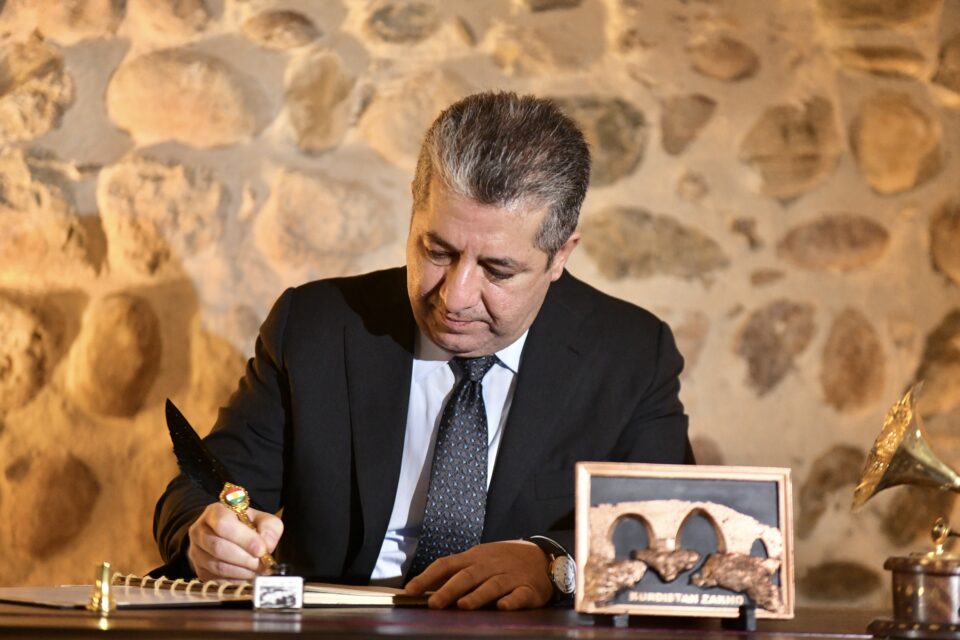Sema
“We reaffirm the Kurdistan Regional Government’s commitment to freedom of opinion, freedom of media and journalism work, and facilitating the work of media professionals,” he stated.
n the occasion of Kurdish Journalism Day, Prime Minister Masrour Barzani issued a message celebrating the historical and professional legacy of Kurdish media while reaffirming the Kurdistan Regional Government’s (KRG) commitment to press freedom and the responsible practice of journalism.
PM Barzani’s statement also marks the founding of the Kurdistan Journalists Syndicate. The day is annually observed to honor the role of Kurdish journalists in preserving language, culture, and truth-telling under difficult political conditions.
“On the anniversary of Kurdish Journalism Day and the publication of the first issue of ‘Kurdistan’ newspaper by Mir Mikdad Midhat Bedir Khan, and the anniversary of the establishment of the Kurdistan Journalists Syndicate, I congratulate all journalists in Kurdistan and wish them success,” Barzani wrote in his message.
Barzani emphasized the enduring principles of media freedom, stating that the KRG remains committed to protecting freedom of opinion and expression, as well as creating a conducive environment for journalists to operate professionally and without fear.
“We reaffirm the Kurdistan Regional Government’s commitment to freedom of opinion, freedom of media and journalism work, and facilitating the work of media professionals,” he stated.
While highlighting the essential role of media in fostering democratic society and accountability, the Prime Minister also called for a balanced and ethical approach to journalism. He urged journalists to pursue their work with responsibility, adhering to laws, ethical codes, and international standards of reporting. PM Barzani cautioned against the use of defamatory or inflammatory language, encouraging instead a tone of professionalism and constructive criticism.
“I hope that Kurdistan’s journalists will be at the level of the greatness and importance of their profession and play their effective role in raising awareness in society, delivering accurate and correct information, and be supporters and helpers of the authorities to support reforms and eliminate mistakes and shortcomings,” he said.
Kurdish Journalism Day remains a poignant reminder of the sacrifices made by generations of Kurdish journalists and intellectuals in pursuit of truth and cultural identity. As the KRG faces ongoing challenges in the political and economic spheres, Barzani’s remarks also underline the necessity of a free but principled press to inform the public and bolster transparency.
Prime Minister Barzani concluded his message with warm regards to members of the media community: “Happy Kurdish Journalism Day, and I wish further progress for Kurdistan’s journalists.”
Tuesday, April 22, 2025, marks 127 years since the publication of the first Kurdish newspaper. In 1898, the first Kurdish newspaper named Kurdistan was published by Mir Mikdad Midhat Bedir Khan in Cairo, the capital of Egypt. The Kurdistan newspaper was printed in the Northern Kurmanji dialect, particularly that of the Jazira and Botan regions, and was released biweekly or at greater intervals. Mir Mikdad Midhat Bedir Khan served as editor-in-chief until the fifth issue, after which his brother Abdulrahman Badrkhan assumed editorial responsibility. In total, 31 issues were published between 1898 and April 14, 1902, across various European cities: issues 1 to 5 in Cairo, 6 to 19 in Geneva, 20 to 23 again in Cairo, 24 in London, 25 to 29 in Folkestone, and the final two issues in Geneva.
The newspaper Kurdistan played a pioneering role in advocating for Kurdish national awareness, cultural preservation, and political rights. Today, its legacy is commemorated through numerous public and private activities, organized across the Kurdistan Region to honor the enduring contributions of Kurdish journalists.
The message reflects a continued recognition of journalism’s vital role in Kurdish society, particularly as the region navigates its path toward greater stability, reform, and international engagement.

